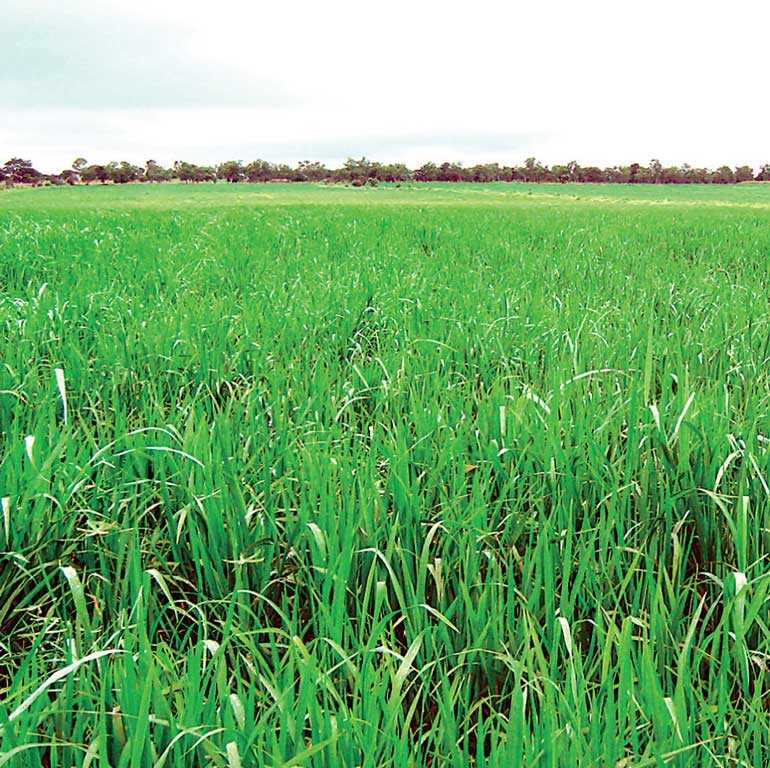Wednesday Feb 25, 2026
Wednesday Feb 25, 2026
Monday, 11 June 2018 00:00 - - {{hitsCtrl.values.hits}}
 Following a series of climate-impacted yields, Sri Lanka’s agricultural sector is forecast to rebound in 2018, with stronger rice production and the reintroduction of tariffs expected to reduce the country’s import bill and strengthen national earnings.
Following a series of climate-impacted yields, Sri Lanka’s agricultural sector is forecast to rebound in 2018, with stronger rice production and the reintroduction of tariffs expected to reduce the country’s import bill and strengthen national earnings.
Rice production for the 2017/18 Maha season, which runs from September to March, is estimated to have reached 2.4m tonnes, according to Department of Agriculture data, a 60% increase on the Maha 2016/17 harvest of 1.5m tonnes.
This was supported by an expansion of harvested land: Some 643,000 ha of paddy were sown to the end of February, compared to the 543,000 ha in the previous year’s Maha.
The forecast increase in production, expected to be sufficient to feed the nation for seven and half months, comes after severe climatic conditions such as drought and flooding led to decade-low harvests in late 2016 and 2017.
Despite the rebound, production levels were still 14% down on normal returns, according to the ministry, while just 79% of the season’s sowed-land target was achieved, with continued drought in some areas and pest infestations cited as inhibiting factors.
Meanwhile, in a positive sign for the broader agricultural sector, the production of other field crops – which include maize, green chilli and potatoes – is forecast to increase by 158% in the current Maha season.
Though estimates for the upcoming Yala season, which runs from May to August, have not been issued, continued favourable climatic conditions should continue to see an increase in activity in the sector.
Reintroduction of import tariffs to support domestic rice growers
The increased production comes amid the reintroduction of tariffs on incoming rice shipments, which officials hope will increase support for local growers and reduce national import costs.
In late April tariffs of Rs. 5 ($0.031) per kg were re-imposed on imported rice, reversing a January 2017 decision that saw charges dropped to Rs. 0.25 ($0.001) per kg.
The reduction in the tariffs, supported by similar measures for other crops such as wheat and maize in August, was introduced to keep consumer costs and inflation in check after lower levels of production pushed up domestic prices. As a result, 800,000 tonnes of rice worth $300.9m were imported last year, a 2244.7% increase on 2016’s outlay of $12.8m, according to the central bank.
However, the increased production in the current season appears to be shifting the balance, with rice import costs falling by 34.4% year-on-year in February, the first month where expenditures on rice, cereals and milling industry products have fallen since January 2017.
Furthermore, the reintroduction of tariffs should prove to be a further disincentive to overseas imports in the short term, and should lead to a further reduction in the agricultural import bill.
The increased yields and reduced import costs are also expected to provide a broader economic boost; the IMF has cited the resurgent agricultural sector as a key factor behind its GDP growth forecast of 4% this year, which comes on the back of 15-year low expansion of 3.1% in 2017, a result weighed down by drought-affected farm output.
Fuel re-pricing
to increase agricultural costs
Despite the increase in paddy production and government measures to support local farmers, one factor that could increase the operating costs of rice farmers is a hike in fuel prices.
Introduced on May 10, the fuel price mechanism – affecting the purchase of petrol, diesel and kerosene – saw fuel costs rise up to 17% for some products, and is expected to have an impact on production and logistics inputs, which will subsequently flow into consumer prices.
With fuel tariffs to be reviewed and adjusted on a two monthly basis, any further increases in the international prices are likely to be reflected in operational and agricultural harvest costs.
(This Sri Lanka economic update was produced by Oxford Business Group.)